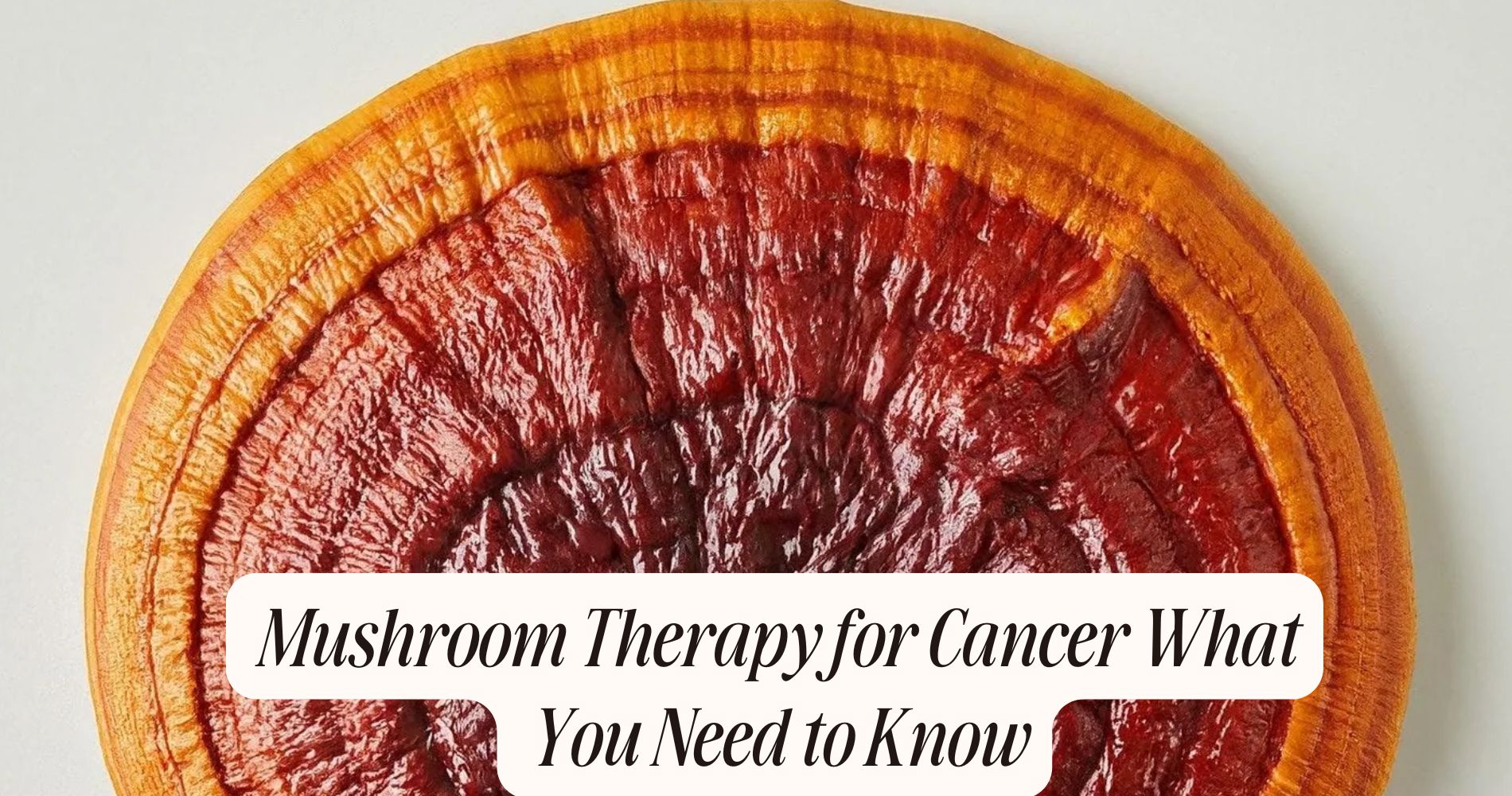
Mushroom Therapy for Cancer What You Need to Know
Mushroom therapy for cancer is gaining recognition for its ability to support immune function and overall well-being. Fungi like reishi, shiitake, and turkey tail contain powerful bioactive compounds, including polysaccharides and beta-glucans, which may help stimulate the immune system, reduce tumor growth, and ease treatment side effects. Research suggests that incorporating these medicinal mushrooms into cancer care can enhance treatment outcomes and quality of life. If you're looking for natural ways to support your health, discovering the potential benefits of mushroom therapy is a step toward informed wellness choices.
Understanding Mushroom Therapy
Mushroom therapy, as you may discover, involves utilizing various fungi for their potential health benefits, particularly in cancer treatment.
Different mushroom types, such as reishi, shiitake, and turkey tail, exhibit distinct therapeutic properties that researchers are beginning to understand.
For instance, reishi is known for its immune-boosting effects, which may enhance the body's ability to fight cancer.
Shiitake contains lentinans, compounds that can stimulate immune responses and may inhibit tumor growth.
Turkey tail is rich in polysaccharide-K, which has shown promise in supporting chemotherapy outcomes.
Key Mushrooms Used in Cancer Treatment
When exploring the domain of fungi in cancer treatment, several key varieties stand out due to their unique bioactive compounds and therapeutic potential.
Lion's mane, known for its neuroprotective properties, may enhance cognitive function and support overall brain health, which can be beneficial during cancer treatment.
Reishi, often referred to as the "mushroom of immortality," offers numerous reishi benefits, such as immune modulation and potential anti-cancer effects.

Studies suggest that reishi can inhibit tumor growth and improve patients' quality of life by reducing stress and fatigue.
Incorporating these mushrooms into your regimen may provide complementary support during cancer therapy, emphasizing the importance of discussing any new treatments with your healthcare provider.
Potential Benefits of Mushroom Therapy
Incorporating mushrooms into cancer treatment regimens offers a range of potential benefits that extend beyond their individual properties. Many mushrooms contain functional compounds, such as polysaccharides and triterpenes, which may enhance the efficacy of traditional therapies.
These compounds can help modulate your immune response, providing essential immune support during treatment. For instance, certain mushrooms like reishi and turkey tail are known for their ability to stimulate immune cell activity, potentially improving your body's defense against cancer.
Additionally, some studies suggest that these functional compounds may help reduce treatment-related side effects, contributing to a better quality of life. By integrating mushroom therapy, you could harness these natural benefits to support your overall treatment journey effectively.
Scientific Evidence Supporting Mushroom Therapy
Research increasingly supports the use of mushroom therapy as a complementary approach in cancer treatment. Numerous studies highlight the efficacy of mushroom compounds, such as polysaccharides and triterpenes, in enhancing immune modulation.
For instance, the beta-glucans found in mushrooms like Shiitake and Maitake have been shown to stimulate immune responses, potentially aiding in tumor reduction and improving overall health outcomes.

Clinical trials indicate that patients incorporating mushroom therapy alongside conventional treatments experience fewer side effects and improved quality of life.
Additionally, some research suggests that specific mushroom extracts may have direct anti-cancer effects, inhibiting tumor growth and proliferation.
As this body of evidence expands, mushroom therapy could become an essential component of integrative cancer care.
Integrating Mushroom Therapy Into Treatment Plans
Mushroom therapy offers a promising avenue for enhancing cancer treatment plans by integrating its benefits with conventional therapies.
By adopting a personalized treatment strategy, you can tailor mushroom therapy to your specific needs and health conditions. Research indicates that certain mushrooms, like reishi and turkey tail, may boost immune function and reduce side effects of chemotherapy.

A holistic approach to cancer care encompasses not just physical health but emotional and psychological well-being as well. Integrating mushroom therapy can complement traditional treatments, potentially improving patient outcomes.
Collaborating with healthcare professionals guarantees that mushroom therapy is safely and effectively incorporated into your treatment plan, allowing for a more thorough strategy to tackle cancer while promoting overall wellness.
Considerations and Precautions for Patients
While considering mushroom therapy, it's vital to evaluate any potential interactions with your current treatment regimen. Certain mushrooms, like reishi or lion's mane, may enhance immune function, but they could also interfere with medications like anticoagulants or immunosuppressants.
Always prioritize patient safety by discussing these options with your healthcare provider, who can assess your unique situation. Additionally, be cautious of sourcing mushrooms, as quality and potency can vary greatly.
It's important to use standardized extracts to guarantee consistent dosing. Keep a detailed record of any changes in your condition or side effects, and report these to your doctor.
Support Your Wellness with SUPER MUSHROOM GUMMIES
Looking for an easy way to incorporate the benefits of mushrooms into your daily routine? SUPER MUSHROOM GUMMIES by Well Gummies offer a powerful blend of 10 functional mushrooms in a convenient, delicious chew. Designed to support immune health, enhance focus, and provide natural energy, these vegan-friendly gummies help you feel your best without the jitters or crash. Plus, with a fresh wild berry flavor, they’re as tasty as your favorite candy. Give your body the support it deserves and experience the power of functional mushrooms every day!
Frequently Asked Questions
Can Mushroom Therapy Replace Traditional Cancer Treatments Entirely?
You can't solely rely on mushroom therapy to replace traditional cancer treatments. While research shows potential mushroom efficacy, it shouldn't substitute established cancer treatment protocols. Always consult healthcare professionals for tailored treatment plans.
Are There Any Side Effects Associated With Mushroom Therapy?
When considering mushroom therapy, you should be aware of potential side effects. While many find it beneficial, mushroom safety is essential, as some individuals may experience adverse reactions or potential allergies to specific varieties.
How Long Does It Take to See Results From Mushroom Therapy?
The results from mushroom therapy vary based on mushroom dosage and therapy duration. Typically, you might notice changes within a few weeks, but full effects can take several months, depending on individual responses and health conditions.
Is Mushroom Therapy Suitable for All Cancer Types?
Mushroom therapy isn't suitable for all cancer types. Different mushroom varieties exhibit varying treatment efficacy, so it's essential to consult your healthcare provider to determine the best approach tailored to your specific condition.
Can I Grow My Own Medicinal Mushrooms at Home?
Yes, you can grow your own medicinal mushrooms at home. Research various mushroom varieties, like reishi or lion's mane, and follow proper home cultivation methods to guarantee successful growth and maximize their potential health benefits.
Conclusion
Incorporating mushroom therapy into cancer treatment can offer potential benefits, but it is crucial to approach it with caution. While certain mushrooms have shown promise in boosting immunity and enhancing treatment efficacy, the scientific evidence is still evolving. Always consult with your healthcare provider before adding any alternative therapies to your regimen. By staying informed and working closely with your medical team, you can make empowered decisions that complement your overall cancer care strategy.




